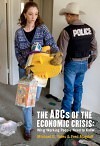Disassembled Wonder
Denise Bergman is author of Seeing Annie Sullivan (Cedar Hill Books, 2005), poems based on the early life of Helen Keller’s teacher, and the editor of an anthology of urban poetry, City River Voices (West End Press, 1992) | more…
Denise Bergman is author of Seeing Annie Sullivan (Cedar Hill Books, 2005), poems based on the early life of Helen Keller’s teacher, and the editor of an anthology of urban poetry, City River Voices (West End Press, 1992) | more…
Last football season the Pittsburgh Steelers stunned fans with an unexpected series of victories. A Steeler Nation—composed of a generation of Pittsburgh’s workers who scattered across the United States as their jobs vanished in the last quarter of the twentieth century—filled stadiums in a dozen cities with their team’s colors, black and gold. The delirium peaked with the Steelers’ victory over the New York Jets, which seemed like an act of God. The improbable twice-missed field goals and overtime win continued the Steelers’ fourteen-game winning streak and their march toward the Super Bowl—until that road was cleanly blocked by the New England Patriots. Whatever deity oversees such matters, she must have a sense of equity or cosmic balance because the Steeler Nation in diaspora enjoyed its moment of glory just as the real, living, here-still-today city of Pittsburgh, near bankruptcy, suffered humiliation and dismemberment | more…

Morbid Symptoms sees health as a major field of political economy, one that focuses on the struggle between commercial forces seeking to make it into a field of profit, and popular forces fighting to keep it — or make it — a public service with equal access for all. | more…

Boggs offers both a keen analysis of U.S. society and a passionate call for revolutionary struggle. He sees the growing trend toward automation, the decline of organized labor, the expansion of imperialism, and the deepening of racial strife as fundamentally rooted in the contradictions of U.S. capitalism. And he concludes that the only way forward is a new American revolution—one that, from his perspective writing in the 1960s, appeared to have already begun. | more…
Over a quarter century after China ventured onto the market path, it is high time to take a hard look and ask some very tough questions. That is what Martin Hart-Landsberg and Paul Burkett did in “China and Socialism: Market Reforms and Class Struggle” (Monthly Review, July–August 2004) and they concluded that “market reforms” have fundamentally subverted Chinese socialism. The considerable costs of economic liberalization, they argued, reflect the inherent antagonisms of the capitalist system that is in the midst of being imposed. “Market socialism” is at best a contradiction in terms, an unstable formation that only awaits progressive degeneration: “the Chinese government’s program of ‘market reforms,’ which was allegedly to reinvigorate socialism, has instead led the country down a slippery slope toward an increasingly capitalist, foreign-dominated development path.” | more…
The transfer of assets from peripheral states to international financial oligarchies is one of the defining tenets of the neoliberal counter-revolution. As a general rule, this latest form of neocolonial transfer of surplus to the industrialized core has proceeded relatively successfully in many peripheral states, with many Latin American states standing out as significant exceptions. In Pakistan, where the ruling state oligarchy has historically been the equivalent of a comprador bourgeoisie, this process has accelerated since it was initiated in the late 1980s | more…

The economic crisis has created a host of problems for working people: collapsing wages, lost jobs, ruined pensions, and the anxiety that comes with not knowing what tomorrow will bring. Compounding all this is a lack of reliable information that speaks to the realities of workers. Commentators and pundits seem more confused than anyone, and economists—the so-called “experts”—still cling to bankrupt ideologies that failed to predict the crisis and offer nothing to explain it. | more…
The global actions of the United States since September 11, 2001, are often seen as constituting a “new militarism” and a “new imperialism.” Yet, neither militarism nor imperialism is new to the United States, which has been an expansionist power—continental, hemispheric, and global—since its inception. What has changed is the nakedness with which this is being promoted, and the unlimited, planetary extent of U.S. ambitions. | more…
For seven years Germany has been governed by a center-left coalition. This government was elected in 1998 because a majority of the electorate was tired of conservatives promising that fiscal austerity, lower unemployment benefits and social security, and restrained wage growth would bring prosperity and full employment. However, the new government’s program has made that of its predecessor look like neoliberalism with a human face. The new government, led by the Social Democratic Party of Germany (SPD), has launched the most severe attacks on labor and social standards since the establishment of a welfare state after the Second World War. Since, for most of its history, the SPD has presented itself as the main force pushing for expansion of the welfare state, its anti-worker actions have deeply disappointed its followers and surprised its opponents | more…
Articles in Monthly Review often end by invoking the socialist alternative to capitalism. Readers in recent years have frequently asked us what this means. Didn’t socialism die in the twentieth century? Wasn’t it defeated by capitalism? More practically: if socialism is still being advocated what kind of socialism is it? Are we being utopian in the sense of advancing a pleasant but impossible dream? | more…
Among the arguments against socialism is that it goes against human nature. “You can’t change human nature” is the frequently heard refrain. That may be true of basic human instincts such as the urge to obtain food to eat, reproduce, seek shelter, make and wear protective clothing. However, what has usually been referred to as “human nature” has changed a great deal during the long history of humankind. As social systems changed, many habits and behavioral traits also changed as people adapted to new social structures. Anatomically modern humans emerged some 150,000 to 200,000 years ago. Over the tens of thousands of years since, many different kinds of social organizations and societies have developed. Initially, most were based on hunting and gathering, while for about the last 7,000 years many have been based on agriculture. These societies were organized as clans, villages, tribes, city-states, nations, and/or empires | more…

Embedded With Organized Labor describes how union members have organized successfully, on the job and in the community, in the face of employer opposition now and in the past. The author has produced a provocative series of essays—an unusual exercise in “participatory labor journalism” useful to any reader concerned about social and economic justice. As workers struggle to survive and the labor movement tries to revive during the current economic crisis, this book provides ideas and inspiration for union activists and friends of labor alike. | more…
Notifications